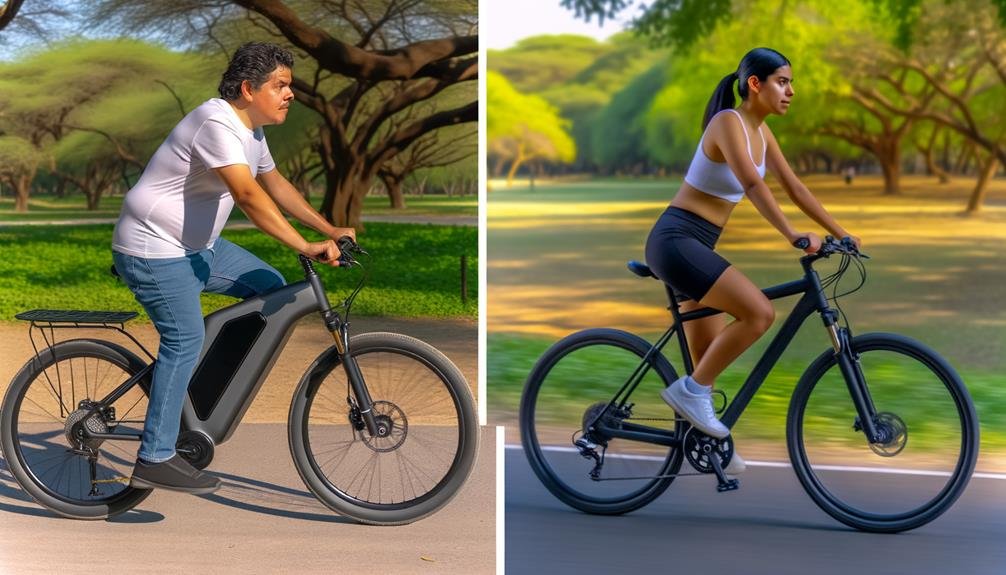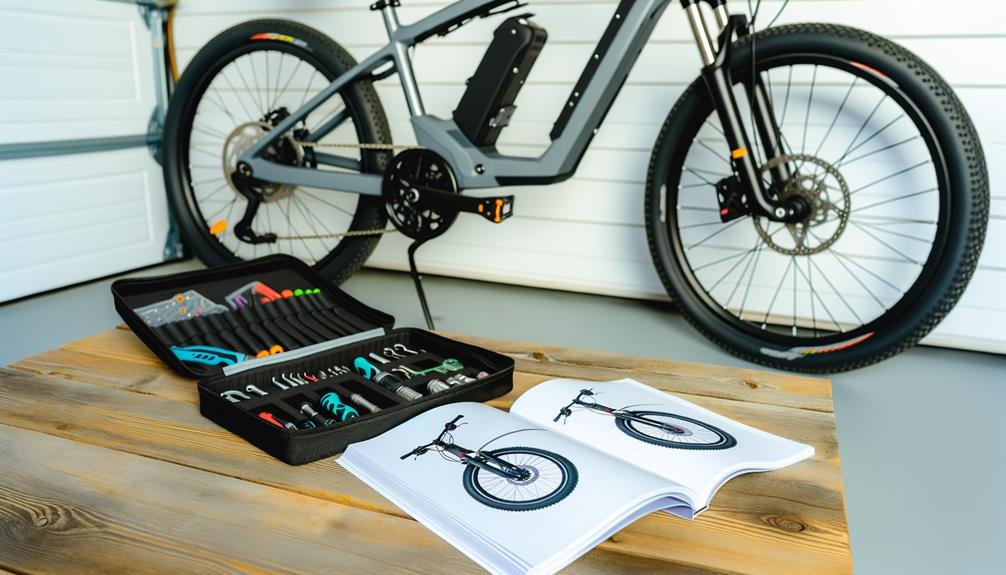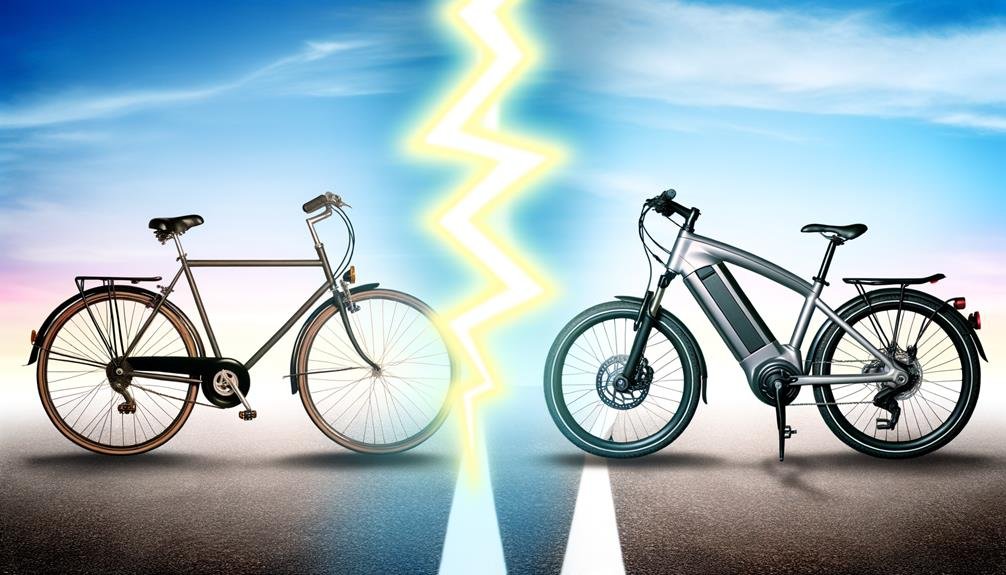Charles Miller is a veteran bike enthusiast with over 12 years of experience dealing with bikes as a mechanic. Despite immense love and expertise for...
While the quiet hum of an ebike contrasts sharply with the grunts and gasps that often accompany traditional cycling, I find myself questioning if the convenience it offers is a necessity or just a novel luxury for me.
As someone who frequently commutes and occasionally indulges in recreational biking, the lure of faster speeds and less physical exertion is certainly appealing. Yet, is the financial investment and the departure from pure, pedal-powered cycling worth it?
Let's break down the factors to consider, weigh the pros and cons, and see if we can make a case for, or against, the need for an ebike.
- Key Takeaways
- Understanding the Ebike Concept
- E-Bike Benefits and Drawbacks
- Comparing Ebikes and Regular Bikes
- Cost Analysis of Ebikes
- E-Bike Range and Speed
- E-Bike Maintenance Tips
- Choosing the Right Ebike
- Safety Measures for Ebikes
- Personal Experiences With Ebikes
- Frequently Asked Questions
- Conclusion
Key Takeaways
- Ebikes offer unique features like cost savings, versatility, and specific designs for various purposes.
- Pedal assist feature makes uphill climbs and longer distances manageable.
- Ebikes are a healthier and more eco-friendly option that reduces traffic congestion and air pollution.
- The initial cost of an ebike can vary significantly, but investing in a high-quality one ensures better performance and durability.
Understanding the Ebike Concept
To grasp the ebike concept, it's crucial to understand that these machines, while similar to traditional bicycles, offer unique features like cost savings, versatility, and specific designs for various purposes, but also come with their own set of considerations like higher weight and cost.
I've found that understanding the ebike concept isn't just about knowing how to ride an e-bike, it's about realizing the vast potential an ebike has to offer.
For instance, there are different types of electric bikes, each designed for a specific purpose – be it cargo hauling, neighborhood strolling, urban commuting, or recreational trail riding. The versatility doesn't stop there; with e-bike conversion kits, you can transform your regular bike into an ebike, making it a shared experience within your community or family.
However, buying an e-bike isn't without its considerations. They're heavier, pricier, and might evoke resistance from traditional bikers. It's also essential to understand the range, speed, maintenance, and local regulations before you buy an e-bike.
Although there are some challenges, the benefits and sense of belonging that come with the ebike community make it all worthwhile.
E-Bike Benefits and Drawbacks
Having dissected the ebike concept, let's now weigh the pros and cons of these electric machines. The question "Do I need ebike?" is a pertinent one. Riding an e-bike has its e-bike benefits and drawbacks.
One of the biggest benefits is the pedal assist feature, which makes uphill climbs and longer distances manageable. It offers cost savings too, as there's no need for licensing or insurance. It's a healthier, more eco-friendly option that reduces traffic congestion and air pollution.
However, it's not all rosy. E-bikes are heavier, which can be a challenge for some. They're also louder and more expensive than traditional bicycles, and might require insurance for theft and liability protection.
| Benefits | Drawbacks | Considerations |
|---|---|---|
| Pedal assist for easier rides | Heavier than traditional bikes | Might need insurance |
| Cost savings | Louder | More expensive |
| Eco-friendly | – | – |
| Improves health and reduces traffic | – | – |
Comparing Ebikes and Regular Bikes

When it comes to comparing ebikes and regular bikes, it's crucial to remember that ebikes offer pedal assistance, making uphill journeys and long rides less strenuous. As a fellow bike enthusiast, I can tell you that the support ebikes provide is a game-changer, especially on challenging terrains.
Now, let's dig a little deeper into this comparison:
- Ebikes are generally heavier and pricier than your conventional bicycle. This is due to the added components like the motor and battery.
- If fitness is your primary goal, regular bikes demand more physical effort, especially uphill. But if you're after a sweat-less commute or leisurely exploration, an ebike is your friend.
- The care and keeping of ebikes involves specialized maintenance for the battery and motor, unlike regular bikes.
Cost Analysis of Ebikes
Let's talk money now.
It's important to scrutinize the initial purchase price of an Ebike, as well as ongoing maintenance costs.
We'll also compare these expenses to the costs of a traditional bike to get a clear picture of where your wallet stands.
Initial Purchase Price
Before diving into the world of ebikes, it's crucial to understand that their initial purchase price can vary significantly, with models ranging from less than $500 to several thousand dollars. If you're planning to buy an electric bike, here's what you need to know:
- The sweet spot for an e-bike is around $1,500. This price point offers a balance between quality and affordability.
- Investing in a high-quality e-bike is a great way to ensure better performance and durability.
- Consider the long-term benefits and cost savings an electric bike can provide.
Getting your first electric bike can be exciting and rewarding. With pedal power and an electric motor, ebikes can offer a sense of belonging in the cycling community while also being eco-friendly and cost-effective.
Ongoing Maintenance Costs
While the initial purchase price of an ebike can be a bit steep, it's also important to factor in the ongoing maintenance costs. As an electric bike rider, I've found that keeping my e-bike in top shape doesn't come without its expenses. Here's a simple cost breakdown to help us understand better:
| Maintenance Item | Frequency | Estimated Cost |
|---|---|---|
| Battery Replacement | Every 3-5 years | $200-$800 |
| Tire Replacement | Every 2-3 years | $20-$50 per tire |
| General Servicing | Annually | $75-$125 |
Comparing Traditional Bike Expenses
Having explored the ongoing maintenance costs of ebikes, it's now crucial to compare these expenses with those associated with traditional bikes.
We're all in this journey of understanding together, and it's essential we delve into the specifics of the costs involved.
- Traditional bikes often have lower upfront costs than ebikes. However, you may find cost savings in the long term with an ebike, especially when comparing to car maintenance costs.
- Regular bike maintenance is usually less expensive and easier to accomplish than ebike maintenance.
- Operating an ebike does incur electricity charges not present with traditional bikes.
In the end, the choice between an ebike and a traditional bike depends on how these factors align with your personal needs and lifestyle.
E-Bike Range and Speed
Let's delve into the specifics of e-bike range and speed, two critical factors that could influence your decision to get one. Typically, an Electric Bicycle can cover 20 to 50 miles on a single charge and reach speeds of 20 to 28 mph.
Riding e-bikes is a unique experience, with the e-bike range and speed influenced by factors such as battery capacity, motor power, your weight, and the terrain you're tackling. Mountain Biking or climbing hills, for instance, could require more power and, consequently, reduce the range.
E-bikes come in Class 1, 2, and 3, each with different speed capabilities and operation styles. Local regulations can also impact how fast you're allowed to zoom around and where.
Maintenance is key to ensuring your e-bike performs optimally. Regular checks on tire pressure, battery condition, and motor performance can help maintain the desired e-bike range and speed.
For e-bike newbies, I'd recommend starting with a model that suits your riding style and needs. Learning how to maximize your e-bike's performance and longevity is part of the exciting journey into the world of e-biking. Welcome to the club!
E-Bike Maintenance Tips

Let's move on to some handy tips for maintaining your e-bike.
From cleaning your e-bike to taking care of the battery, and regular brake checks, there's a fair bit to consider.
I'll walk you through these important tasks to keep your ride running smoothly and safely.
Proper E-Bike Cleaning
When it comes to e-bike maintenance, one of the first things you'll want to focus on is proper cleaning. I use a gentle soap or a bike-specific cleaner to prevent any damage to the components. Proper e-bike cleaning is like a ritual for me, not only for my new folding electric bikes but for all 73 bikes I've had over the years.
Here are a few tips that I've picked up along the way:
- Always pay special attention to the chain, gears, and brakes.
- Take good care of your e-bike battery – avoid extreme temperatures and keep it charged.
- Regularly check your e-bike for any signs of wear and tear.
Routine Battery Care
Caring for your e-bike's battery is a crucial part of maintenance that can significantly extend its lifespan. Whether you ride your electric mountain bike for fun or use it to commute to work each day, routine battery care is essential.
It's all about being a responsible e-biker. As the rider is pedaling, the battery's strength matters. Regularly check the charge level and recharge it before it gets too low. Extreme temperatures can affect its performance, so avoid them when you can.
When cleaning your e-bike, use gentle soap to avoid damaging the battery components. Regular inspections for any signs of damage can help ensure a long-lasting battery life.
We're in this ride together, let's make it a great one.
Brake System Checks
Keeping your e-bike's brake system in check isn't just a good idea, it's a necessity for safe and smooth rides. Whether you're a seasoned road bike rider or you've just started riding to work, regular brake system checks are crucial.
Regularly inspect your brake pads. If they're worn down to the indicator line, it's time for a replacement.
Check the brake discs for any damage or warping. Replace them if necessary.
Always ensure that the brake calipers are properly aligned and functioning smoothly.
Choosing the Right Ebike

Choosing the right ebike can seem daunting, but it's crucial to find one that fits your individual needs and lifestyle. If you're asking yourself "do I need ebike?", consider the following key factors: purpose, terrain, and price.
For the purpose, will you be commuting on an electric road, going off-road, or just casual cruising? If you're regularly traversing rough terrains, you might need a mountain ebike. For city commuting, the best folding ebike is convenient for storage and transport.
Terrain is another consideration. Ebikes come with different power capacities. If you're tackling steep slopes, you'll need more power. Remember, it's not just about speed but also the ability to travel distances on power alone.
Lastly, price should fit within your budget. High-end models offer more features, but there are affordable options that don't compromise on quality.
As you embark on choosing the right ebike, consider the following:
| Purpose | Terrain | Price |
|---|---|---|
| Commuting, off-road, casual cruising | Flat, hilly, mixed | Affordable, mid-range, high-end |
Safety Measures for Ebikes
When it comes to ebikes, ensuring your safety should always be a top priority. As we discuss the question, 'Do I need an ebike?', we should also consider the essential safety measures for ebikes.
Riding an ebike, like the popular folding bikes, to work can be an enjoyable experience. However, it's crucial to remember that safety comes first. Here are some measures that can help:
- Always use bike lanes where available. They're specifically designed for cyclists and offer a degree of separation from traffic.
- Wear a helmet and bright clothing to increase your visibility to drivers.
- Regularly check your ebike for any mechanical issues.
These steps won't only ensure your safety but also enhance your overall biking experience.
Personal Experiences With Ebikes

Delving into my personal experiences with ebikes, I've found them to be an efficient and cost-effective mode of transportation that cater to a variety of needs. They've made my daily commute to work a little less daunting, making it easier to climb hills and combat wind resistance. I've also noticed a considerable saving in licensing and insurance costs.
On weekends, I've used my ebike to explore new trails, a joy that I share with other mountain bikers in my community. Ebikes have made these adventures easier and less physically demanding, which invites more people to join in. This sense of belonging is one of the many benefits ebikes can offer.
However, it's not all sunshine and rainbows. Ebikes are heavier and noisier than traditional bikes, and they can be more expensive. But the longer range, assisted hill climbing, and the overall improved well-being they provide outweigh these drawbacks for me.
If you're considering an ebike, my advice is to weigh the pros and cons based on your needs and lifestyle. You might find, like I did, that an ebike is exactly what you need.
Frequently Asked Questions
Are Ebikes Worth Getting?
Absolutely, they're worth getting! With an ebike, I've found a sense of community, plus it's fun and promotes fitness. Despite some drawbacks, the benefits far outweigh them. I'd recommend an ebike to anyone.
Why Not to Buy an Electric Bike?
Asking why not to buy an electric bike? Well, they're costly, need special maintenance, and are heavier. Plus, you've gotta plan charging times. If you're living flat and short-commuting, you may not need one.
Is It Better to Buy an Ebike or a Regular Bike?
Isn't it great to have options? It really depends on your needs. If you want speed, ease, and efficiency, an ebike's for you. But if you prefer a lightweight, traditional experience, go for a regular bike.
What Are the Disadvantages of Ebikes?
E-bikes certainly have drawbacks. They're pricier initially, require more upkeep, especially for batteries and motors, and are heavier. Plus, there's the extra step of ensuring the battery's charged before you can ride.
Conclusion
In a nutshell, deciding on an ebike is like choosing the right spice for a meal. It adds a zesty twist to regular biking, with its cost savings and range perks.
Yet, it's not for everyone. Weighing the pros and cons, understanding the cost, and knowing the maintenance needs are crucial.
If it aligns with your lifestyle, budget, and local regulations, an ebike might just be the secret ingredient to your daily commute or weekend adventure.

Charles Miller is a veteran bike enthusiast with over 12 years of experience dealing with bikes as a mechanic. Despite immense love and expertise for his Tacoma, he rides his Trek Ebike more. Anytime you meet him, you’ll either hear him talking about Bikes, or writing about all things bikes and cars on this blog.
More Posts


